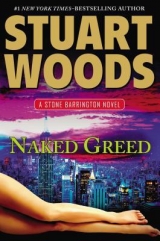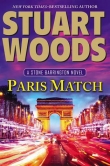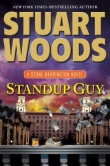
Текст книги "Naked Greed"
Автор книги: Stuart Woods
Жанр:
Криминальные детективы
сообщить о нарушении
Текущая страница: 8 (всего у книги 15 страниц)

Stone called Dino the following morning.
“Hey,” Dino said. “I guess you want to know if we’ve caught your shooter yet.”
“A positive answer would be an excellent start to this conversation.”
“Then let’s begin at the beginning: Who wants you dead?”
“Only one guy that I know of, and he got dead first.”
“The Russians again, maybe?”
“I think Lance Cabot negotiated me out of that mess. They might like to see me dead, but I don’t think they want to unnecessarily piss off the CIA.”
“I’ll buy that.”
“We talked about Ryan and Parisi the younger.”
“Like I said, from what we hear on our recordings, young Parisi is rich now, and Ryan has been given a payoff and told to go away.”
“Well, it’s all just so perfect, isn’t it? Except for the part about somebody firing three rounds into my car yesterday.”
“We could just wait and see what happens.”
“Gee, that’s a swell idea. If I get dead, then maybe you’ll find a clue.”
“You’re sure it’s not the guys who are after Major Rattle?”
“Felicity and I talked at length about that yesterday: only she, Holly, and I knew that Ian was staying here.”
“Okay, I’ll buy into that.”
“Any other ideas?”
“Maybe Ryan hates your guts enough to do you for free.”
“That would be weird, since we hardly know each other.”
“Not everybody thinks you make a good first impression.”
“It would be interesting to find out if Ryan owns a motorcycle, a .45, and has a shoulder wound. Think some of those flatfoots who work for you could look into that?”
“I guess that’s not the worst use of their time I can think of.”
“Well, send somebody down to the nearest donut shop and roust ’em out, okay?”
“Okay, I’ll get back to you.”
“I’ll wait with bated breath.”
“You do that.”
–
Stone hung up and thought about Ryan. The man did seem to have a short fuse, but after one brief encounter, would he hold a grudge? It seemed far-fetched to him.
Joan came into his office. “Fred and I have talked with the Bentley service department. They’re all agog—they’ve never had a customer with three bullet holes in the backseat.”
“I guess not. What did they suggest?”
“A new backseat. It would take at least a month, what with shipping and all.”
“Tell them to air-freight it.” Joan nodded and left.
Felicity called. “I had breakfast with the ambassador.”
“Did you smooth his feathers?”
“Yes, and even better, I just blamed it all on you. When Ian gets out of the hospital he can move into the embassy residence.”
“That sort of frees you up, doesn’t it?”
“I believe it does. I have some tidying up to do here. Will six o’clock be all right?”
“At the stroke of the cocktail hour—that will be extremely satisfactory. Shall I send the car for you?”
“Thank you, you’re a sweetheart.”
“Until then.” He hung up, buzzed Fred, and arranged it.
Joan buzzed him. “There’s a secretary on the line who says her boss is the ambassador to the UN from Dahai, and he wants to speak with you.”
Bad joke, Felicity, he thought. “Put him on.”
“Line two.”
Stone pressed the button. “This is Stone Barrington.”
“Mr. Barrington,” a woman with a slightly accented voice said, “Ambassador Abdul-Aziz wishes to speak to you.”
“Certainly,” Stone said, “put him on.”
“Mr. Barrington,” a man’s voice said, in a very British accent.
“Yes, Mr. Ambassador?”
“Do you understand who I am?”
“I’m given to believe that you are Dahai’s ambassador to the UN.”
“That is correct.”
“How may I help you?”
“I wish to speak with you on a confidential matter.”
“Go right ahead.”
“I think it would be better if we meet.”
“I’m in my office for the rest of the day.”
“It would be better if you could come to my residence. I’m in the UN Plaza apartment building.”
This was turning into a very elaborate joke; Stone thought he might as well see where it led.
“All right.”
The man gave him an apartment number. “Would six o’clock be acceptable?”
“I’m afraid I have an engagement at six. Four would be better.”
“That will be satisfactory,” he said. “I will see you at that time.” He hung up.
Joan came in. “Was that a practical joke?”
“It could very well be. I’m going to play it out and see.”
–
Stone presented himself at the reception desk at UN Plaza, a handsome building across the street from the UN building that had been built in the 1960s. He remembered a character in a movie saying, “If there is a God, he probably lives in this building.” He gave his name to the desk clerk and was told to go right up, he was expected.
The door was answered by a butler in tails, who led him into a large living room furnished in white sofas and chairs, with a spectacular view of UN Headquarters and the East River.
“May I get you some refreshment?” the butler asked.
At that moment the ambassador appeared. He was a smallish man of about five feet seven inches, dressed in a sharply tailored Savile Row suit. “Good afternoon, Mr. Barrington,” he said, extending a hand.
Stone shook it. “Good afternoon, Ambassador.”
“May I offer you a drink? Alcohol is not prohibited in my residence.”
“Thank you, just some fizzy water.”
The ambassador instructed the butler to bring it, and a martini for himself. “It’s five o’clock somewhere, is that not the adage?”
“It is.”
They sat down and waited for their drinks.
“Before we begin, Mr. Barrington, may I ask, are you acquainted with a Major Ian Rattle?”
“Rattle? Is that a real name?”
“It is, I assure you.”
“No, I am not acquainted with him,” he lied.
“Good, because I wish to bring a lawsuit against him,” the ambassador said.

Gene Ryan was frightened of coming here but more frightened of not coming. He rang the bell in the late afternoon and waited. He was greeted by a chorus of barks, large and small, from somewhere toward the rear of the house. After a count of about twenty-five, a man came to the door, dressed in green hospital scrubs and about three days of stubble. “Yeah?”
“I’m the guy Eddie sent.”
“Right, come on in.”
The walls of the reception area were plastered with photographs of kittens and puppies and the occasional potbellied pig.
“It’s a shoulder wound, right?” the veterinarian asked.
“Right.”
“Take off your jacket and your shirt.”
Gene struggled out of the clothing; his shirt was bloodstained in spite of the makeshift dressing he had applied and the change of clothes. He was directed to sit on the examination table.
The vet ripped off the bandage. “Flesh wound, in and out,” he said. “Missed the shoulder joint.”
“You should see the other guy.”
The vet laughed. “It’s a thousand, cash,” he said, “including drugs.” Gene had the money already counted out and paid him. The vet pocketed the money. “This was what, a few hours ago?”
“Last night. It took some time to locate you.”
“Okay, lie down on your right side, so I can get at this thing.”
Gene stretched out on the table, which was Great Dane–sized.
The vet came at him with a large syringe and a curved, steel pan to catch the overflow. He irrigated the wound from both the front and the back, causing Gene to writhe in pain.
“You got some infection there,” he said.
“You got any novocaine?” Gene asked testily.
“Lidocaine, sure.” He went to a cabinet and came back with a filled syringe, then injected both the entry and exit. “Give it a minute,” he said.
Gene gave it a minute, and he began to feel the pain fade a little. “Okay, it’s working.”
“Good, because I’m going to run a swab all the way through.” He did so.
“Jesus!” Gene cried. “Give the novocaine a little more time, okay?”
“I’m done torturing you,” the vet said. “All I have to do now is stitch, and you won’t feel that.” He swabbed the area with a brown fluid, then attacked both ends with a curved needle and catgut. “There, all patched up.”
Gene started to rise.
“Not yet, you’ll need an antibiotic. Are you allergic to penicillin?”
“No.”
“Good.” The vet stabbed him in the upper arm with a syringe and emptied it into him, then he applied a dressing. “You’re done. You can get dressed.”
Gene got into his shirt and jacket and was handed a plastic bottle of pills.
“More penicillin,” the vet said. “Take one every four hours. That’s the Irish wolfhound dosage,” he snickered.
“This is for dogs?”
“It’s penicillin. Change the dressing twice a day and put some antibiotic cream on the wound when you do. You can get it at any drugstore. Call me in two or three days if the infection doesn’t go away. Now, beat it, I’m late for dinner.”
Gene got out of there. A fucking veterinarian! This was one more humiliation that he held against Barrington.
–
Stone stared at Ambassador Abdul-Aziz. “Who recommended me to you?”
“That is confidential.”
“All right, who is this Rattle, and what do you want to sue him for?”
“He is an intelligence agent of the British government,” the man replied, “and he is responsible for the murder of five of our sultan’s subjects.”
“Is Mr. Rattle a resident of Britain?”
“Major Ian Rattle, yes.”
“That would present difficulties. Why don’t you sue him in Britain?”
“Because we have information that he is in New York as we speak. And anyway, the court system here might be more favorable for our cause.”
Stone took a jotter from his jacket pocket and uncapped his pen. “What is Major Rattle’s address in New York?”
“Ah, we have not yet determined that, but we should know soon.”
“If you don’t know where he is, how do you know he’s in New York?”
“We have very accurate information from a source who must remain anonymous.”
“All right, who are you alleging Rattle killed?”
“Our sultan’s twin sons and his nephew and two pilots of his Royal Air Force.”
“They were killed in an airplane?”
“In an airplane crash.”
“And how did Major Rattle effect this crash? Was he aboard, as well?”
“No, his hirelings, who call themselves Freedom for Dahai, fired a rocket at the aircraft as it was approaching our airport.”
“How do you know who killed them?”
“They issued a press release claiming responsibility.”
“And how do you know that Major Rattle persuaded them to commit murder?”
“Again, from a confidential informant, who is completely reliable.”
“Ambassador, it is possible in this country to bring a civil suit for a criminal action, but usually, a conviction is sought first.”
“We have read of the intricacies of your criminal justice system and the appeals process. We believe we can more quickly satisfy our aims with a civil suit.”
“And what are your aims?”
“To show the world that the British are uncivilized and to receive compensation for the families of the dead and for the cost of the airplane.”
“If you want the world to know that the British are uncivilized, why don’t you simply hold a press conference and announce it. That would be much less expensive than bringing a lawsuit.”
“We wish our denouncement of the British to have the force of law, thus the suit.”
“I see. And what damages are you seeking?”
“Five hundred million dollars—one hundred million for each family involved—and forty-five million dollars for the aircraft, a Gulfstream 450.”
“Now we come to the matter of witnesses: Did anyone see the freedom fighters shoot it down?”
“Many people saw the crash.”
“But did anyone witness these people firing the missiles?”
“Our government is tor– questioning potential witnesses as we speak.”
“I see. And was there a witness present when Major Rattle ordered the missile attack?”
“Again, we are questioning potential witnesses now.”
“Is there any scientific evidence of the crime—for instance, can you prove the missile was of British origin?”
“We have determined, from inspection of fragments, that the missile employed was of Russian origin.”
Stone made something of a display in capping his pen and returning the jotter to his pocket. “I’m afraid, Ambassador, that a lawsuit at this time is premature.”
“What do you mean?”
“I mean that, at this moment, you have no witnesses or other evidence to connect this Major Rattle to the crime, nor to identify the perpetrators. The only facts you can place in evidence are that the victims are dead, the aircraft destroyed, and that the missile used was of Russian origin, which contradicts your other allegations.”
“But we wish to file the lawsuit immediately, to bring this horrible crime to the attention of the world.”
“If you should do so, the suit would be dismissed out of hand by the judge at the first hearing, for lack of evidence. And I must tell you, Mr. Ambassador, that should this case go to trial, I would much rather represent the defendant than the claimant.”
The ambassador sat, blinking rapidly, apparently unable to speak. Finally, he found words. “Then I must apologize for wasting your time, Mr. Barrington. Good day.” He rose and left the room.
The butler approached. “This way out, please.”

Fred showed Felicity into the study and took her luggage up to the master suite, as instructed.
Stone embraced her. “You look very beautiful,” he said.
“A great weight has been lifted from me,” she said. “That sort of relief, rare as it is, tends to knock off about ten years.” She accepted a martini. “Cheers. How was your day?”
“Surreal,” Stone replied. “I received a phone call from the Dahai ambassador to the UN, a fellow named Abdul-Aziz, asking me to come see him.”
“I know of the man. He is a brother of the sultan of Dahai. Why on earth would he want to see you?”
“He wanted to retain me as his attorney to file a lawsuit in New York.”
“How would he even know of you?”
“That, like most of everything else he said, was shrouded in secrecy.”
“Whom did he wish to sue?”
“Ian Rattle.”
Her mouth fell open; she closed it. “Don’t make me pull this out of you, Stone.”
“He said that Ian was responsible for the deaths of the twins, who were the sultan’s sons; another man, who was his nephew; and two pilots of the Dahai air force. He wanted me to file a wrongful death suit, seeking five hundred and fifty million dollars for their families and the cost of the airplane.”
Felicity clasped her breast. “I am staggered. Did he actually know you know Ian?”
“I don’t believe so. In any case I feigned ignorance.”
“And how did you respond to his request?”
“I told him that he had no grounds for a suit and that, given his lack of evidence, I would rather represent the defendant than the complainant.”
Felicity burst out laughing. “And how did he respond to that?”
“He invited me to leave.”
“I expect so.”
“He attributed nearly all his answers to my questions to a confidential source.”
“Did he give any hint as to who that might be?”
“He did not. I’m sorry I didn’t do a better job of getting it out of him, but I was so flabbergasted that my mind wasn’t working properly.”
His cell phone rang, and he glanced at it. “Excuse me for a moment, it’s Dino. Hello?”
“Hey.”
“Hey.”
“I thought you’d like to know that we rousted Gene Ryan a few minutes ago. We found him at home.”
“Did he have a motorcycle and a shoulder wound?”
“We didn’t have enough for a search warrant to look for the bike, and short of slapping him on the back, we couldn’t search him for a wound, either. He was sitting in his living room, having a beer and watching the news, like a normal person. He denied everything, of course.”
“What do you need for a search warrant?”
“Pretty much an eyewitness. That could be Fred, of course, but he didn’t see enough to be of much help. You want dinner tonight?”
“I’d love to, but I’m plying a dinner guest with liquor as we speak.” He smirked at Felicity.
“That would be Dame Felicity Devonshire of MI6, would it not?”
“I will neither confirm nor deny that.”
“You can hide nothing from me. See you later.” Dino hung up.
“And how is Dino?” Felicity asked.
“Just fine. He guessed you were here.”
“I guessed he would.”
“How is Ian coming along?”
“He was discharged early this afternoon and is resting in his new flat in the embassy residence.”
“A pity I couldn’t worm the name of your mole out of Abdul-Aziz, then he could go home.”
“I needed some new blood in New York, anyway.”
He cocked his head and looked at her. “You seem awfully relaxed about the mole.”
“Relax is all I can do, until we’ve worked through our investigation.”
“And how long is that going to take?”
“As long as it takes.”
“And Ian has to live with that for the duration?”
“He’ll be pretty much under wraps in New York. It’s not like he’s going to be making public appearances.”
Stone looked at his watch. “The Four Seasons?”
She smiled. “You know how I love that place.”

Stone was briefly awakened the following morning by Felicity getting out of bed, and he had a vague memory of hearing her in the shower, but when he finally was awakened by the buzzer from the dumbwaiter, announcing breakfast, she was gone, and there was a note on the bed.
Sorry, I hope I didn’t wake you, but I got a call and have a fire to put out. I’ll call you as soon as I can.
Stone ate his breakfast, read the Times, and got to his desk a bit later than usual. Felicity hadn’t called. His stomach announced the approach of noon, and he felt like getting out of the house. He took a cab to the Upper East Side, to a town house in the Sixties housing a club he had been elected to the year before. The place had no name; it was referred to by most of its members as “the place on the East Side,” and Stone had not used it much since he and Dino had been elected to membership, Dino first. The cab deposited him on the sidewalk a couple of doors down from the house, and he walked the last few steps to the front door.
He had put a hand out for the door handle when the door, anticipating him, silently opened and closed behind him. A man at a desk inside said, “Good day, Mr. Barrington,” indicating to Stone that something had recognized him as he entered, because he didn’t know the man at the desk.
He took the elevator to the top-floor restaurant and emerged into a room lit by the sun through skylights and a wall of French doors that opened onto a roof garden. He decided to sit outside and stopped at the bar there and ordered a Buck’s fizz, as the British and the club bartender called a mimosa—half orange juice, half champagne. He took a seat at the bar and surveyed the roof garden. Familiar faces from the business community, the arts, and politics dotted the crowd. A man approached the bar and took a stool a couple down from Stone.
“Good morning, Stone,” the man said, and Stone turned to find the senior senator from New York, Everett Salton, sitting there.
“Good morning, Ev,” Stone replied. He had met the man only a couple of times, but he recalled the warmth and bonhomie the man exuded. He had managed to make himself seem, on first meeting, like an old friend.
“Funny I should bump into you,” Salton said. “Just got off a helicopter twenty minutes ago after a closed hearing of the Senate Select Committee on Intelligence. Your name came up.”
Stone was sorry to hear it. “I hope it was not taken in vain,” he said.
“Aspersions were cast, but I did what I could to soften them.”
“I can’t imagine why a closed session of an important committee would be bandying my name about when I feel so perfectly innocent of doing anything that might offend them in the slightest degree.”
“An innocent heart is a perfect shield,” Salton said. “I would attribute the quote, but I made it up only just now.”
“You have the soul of a poet, Ev.”
“You are not the first to notice,” the senator replied with a small smile.
“I suppose, due to the secret nature of the session, that you are unable to tell me what thought or deed on my part led to this testimony?”
“It was not so much testimony as conversation.”
“Gossip, perhaps?”
“Perhaps, but members tend, when in session, anyway, to rely on fairly solid sources for their assertions. May I buy you some lunch?”
“Thank you, yes.”
Salton raised a finger, and a headwaiter materialized beside him and led them to a discreet table shaded by a potted ficus tree. They glanced at a menu and both ordered the haddock and a glass of Chardonnay.
“Can you characterize the nature of the gossip without endangering the safety of the nation?” Stone asked after the waiter had left with their order.
“I think about all I can say is that some present were of the opinion that you might be harboring a fugitive.”
“A fugitive from what?”
“Justice, apparently.”
“I have a roomy house and often have guests, but I can’t recall any one of them who might attract the attention of the law.”
“Perhaps I should have said ‘natural justice.’ Think British.”
“I have recently had a guest who had something to fear from what one might conceivably call vigilante justice,” Stone said.
“And on what was his fear based?”
“Two previous attempts to render him, ah, irrelevant.”
“Ah, yes, irrelevance is a nasty state.”
“I find it impossible to imagine why any member of your committee might find his presence in my home to be antithetical to my country’s interests.”
“May I ask how he came to be in your home?”
“He was there at the request of two government officials.”
“Was one of them ours?”
“Yes.”
“Legislative, judicial, or executive?”
“Executive.”
“I don’t suppose you’d care to tell me who?”
“I would, reluctantly, if I was subpoenaed by your committee and placed under oath.”
“You wouldn’t take the Fifth?”
“I would have no fear of self-incrimination.”
“An invitation to testify may not be so far from possible as you might imagine.”
“I am at the committee’s disposal.”
“Can you not tell me anything that might reassure me enough for me to reassure my members?”
“I believe I’ve already told you that much.”
“The members are fond of the explicit.”
“Then they should exercise their power to elicit explicit answers.”
“I’ve heard you are a very good lawyer, and now I believe it.”
“It’s easy to be a good lawyer when your heart is pure.”
Salton laughed. “I think it would be very entertaining to see you before my committee.”
Stone laughed, too. “Is there anything I can say that might assuage the fears of your members?”
“You could say that neither of the government officials in question was our president.”
“It was not. There, does that make you feel better?”
“Much, thank you.”
Their lunch arrived, and they ate it with gusto, conversing on other subjects.








